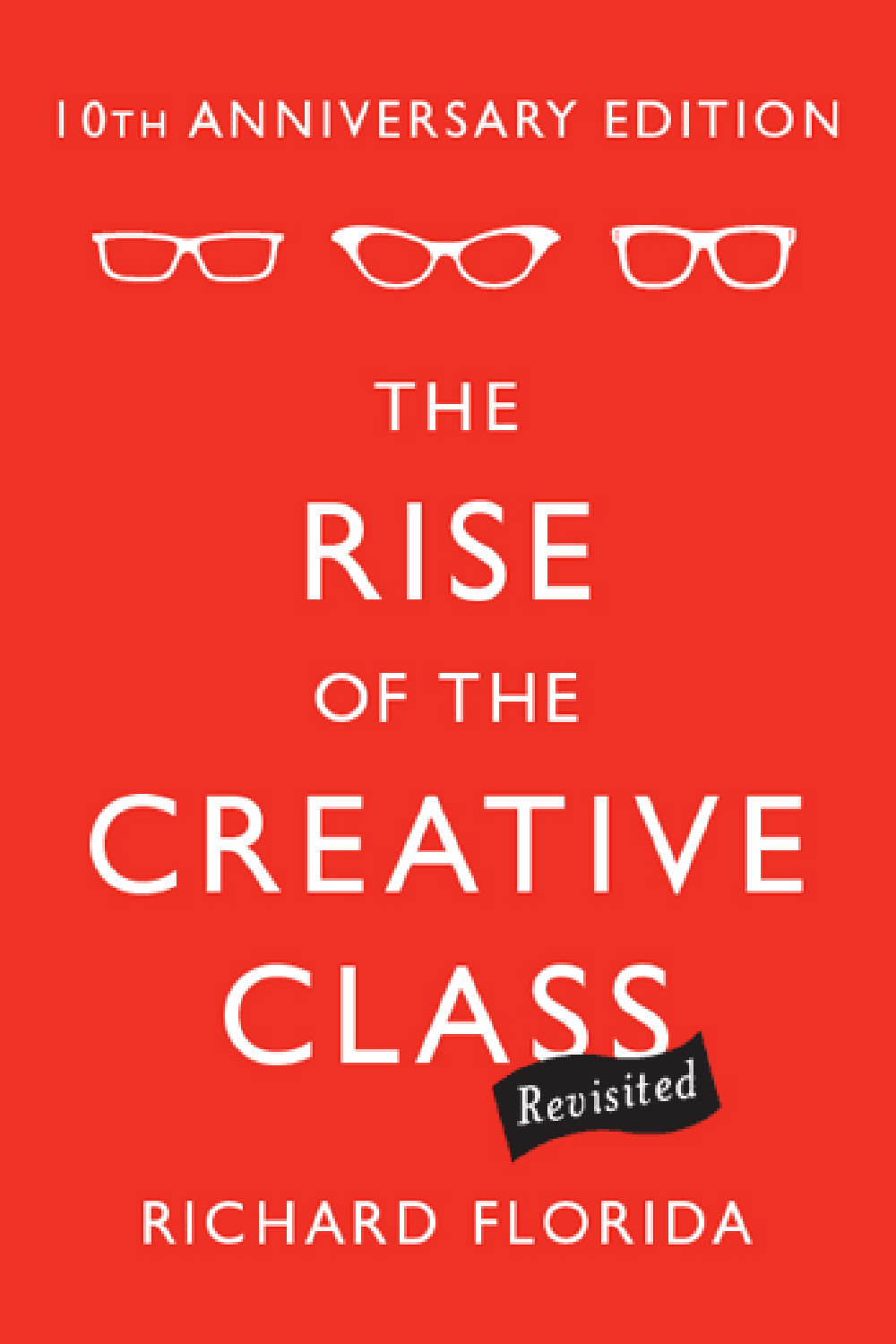Lee Fisher and Joe Cortright review top summer reads for urban leaders,including Richard Florida’s The Rise of the Creative Class Revisited.
The Rise of the Creative Class Revisited
By Richard Florida
World-renowned urbanist Richard Florida’s bestselling classic on the transformation of our cities in the twenty-first century — now updated with a new preface
In his modern classic The Rise of the Creative Class, urbanist Richard Florida identifies the emergence of a new social class reshaping the twenty-first century’s economy, geography, and workplace. This Creative Class is made up of engineers and managers, academics and musicians, researchers, designers, entrepreneurs and lawyers, poets and programmer, whose work turns on the creation of new forms. Increasingly, Florida observes, this Creative Class determines how workplaces are organized, which companies prosper or go bankrupt, and which cities thrive, stagnate or decline.
Florida offers a detailed occupational, demographic, psychological, and economic profile of the Creative Class, examines its global impact, and explores the factors that shape “quality of place” in our changing cities and suburbs. Now updated with a new preface that considers the latest developments in our changing cities, The Rise of the Creative Class is the definitive edition of this foundational book on our contemporary economy.
“… ‘The Rise of the Creative Class — Revisited,’ which is the manifesto of progressive urbanists.”
Erika D. Smith, Indianapolis Star
“Summer Reading for Urban Leaders”
Lee Fisher and Joe Cortright, The Huffington Post
“On the 10th anniversary of the Rise of the Creative Class, Florida has revisited and revised what quickly became the playbook for urban renewal in many communities”
Jay Robbs Reviews Business Books
This book
“… clear some of the ground for modern reform…”
John Lloyd, The Financial Times
“Richard Florida’s The Rise of the Creative Class is an important book for those who feel passionately about the future of the urban center.”
Herbert Muschamp, New York Times, Year in Review
“… a pioneering cartographer of talent.”
Fast Company
“An urban-development expert…His ideas about revitalizing cities by attracting artists and high-tech workers have influenced a generation of urban planners.”
Andrea Sachs, TIME
“Florida draws a vivid picture of what it takes to make a great 21st-century city.”
Denver Post
“…Florida’s work is challenging many of the verities of the field.”
Salon.com
“Richard Florida is a phenomenon… there is no academic quite like him.”
The Globe and Mail
“Richard Florida is a one-man think tank and guru for companies in need of a creative jolt.”
The Australian Financial Times
“Florida’s research and experiences over the past decade have given him the foundation on which to build a new view of business reality.”
Informationweek
“Melbourne Lord Mayor Robert Doyle keeps a copy of Florida’s book in his office.”
The Australian
Business Bestseller
Periplus Online Bookstore
Financial Times review of The Rise of the Creative Class Revisited. This book clears some of the ground for modern reform.
Florida revisits his book The Rise of the Creative Class and rewrote it to reflect modern times. In The Rise of the Creative Class–Revisited: 10th Anniversary Edition–Revised and Expanded, he explores what social forces brought down the traditional corporate world and led to a rise in the counterculture.
Jay Robb reviews Richard Florida’s latest book, The Rise of the Creative Class Revisited.
Journalist Jon Talton talks to Richard Florida about his new book, The Rise of the Creative Class Revisited.
Four years after the great economic and financial crash of 2008, the U.S. economy continues to sputter and Europe teeters on the brink of economic collapse. Only one advanced nation has been able to rebound to pre-crisis levels of jobs and economic output: Canada.
Excerpted with permission from The Rise of the Creative Class Revisited: 10th Anniversary Edition, by Richard Florida. The tectonic upheavals our economy is enduring are the result not just of financial shenanigans by the global One Percent, but of a deeper and more fundamental shift — the passing of the old industrial order as it gives way to the emerging Creative Economy. If we wish to build lasting prosperity we cannot rely on market forces and the Invisible Hand alone to guide us. The grand challenge of our time is to invent new institutional structures that will guide the emergence of a new economic order, while channeling its energies in ways that benefit society as a whole.
Florida’s 2002 bestseller, “The Rise of the Creative Class,” has sparked many debates about the relative importance of creativity to the economic health of cities. In his new book, “The Rise of the Creative Class — Revisited,” Florida reiterates, updates and expands on his bottom line: “Cities need a people climate as much, and perhaps even more, than they need a business climate.” Paul Fanlund interviews Richard Florida asking him a series of Madison-centric questions.
Crain’s talked with urbanist Richard Florida about some of the opportunities and challenges Chicago faces as it tries to remake its economy and shine more light on its technology companies.
Richard Florida, professor at University of Toronto and NYU, and senior editor of The Atlantic, was in London when he caught up with Adam Leipzig for an interview. His book, The Rise of the Creative Class, transformed Leipzig’s thinking about how creative people work and affect society; the tenth anniversary edition, The Rise of the Creative Class – Revisited, goes even further and helps us understand how to focus our efforts in the coming decade.
Michael Hill interviews Richard Florida on the release of his latest book, The Rise of the Creative Class Revisited.
Britannica contributing editor Gregory McNamee caught up with Florida to ask a few questions about the new version of his book, The Rise of the Creative Class Revisited, in which, having crunched the numbers on 300-plus U.S. metropolitan areas, he observes, “Human capital may reflect richer places, but it seems that the creative class makes a place more productive.”
Ten years ago, Richard Florida published his first book about how creativity was emerging as a common
element shaping America’s economy, geography,communities, and jobs. Now, in The Rise of the Creative Class: Revisited, Florida reveals updated statistics and discusses how the United States has reached a Creative Age that will be the driving force behind its economic recovery. Florida recently spoke with U.S. News about how creativity has pervaded every aspect of Americans’ lives, but has also
caused a new kind of class divide.
Richard Florida speaks with U.S. News about how creativity has pervaded every aspect of Americans’ lives, but has also caused a new kind of class divide.
Ten years ago, Richard Florida’s The Rise of the Creative Class turned its author into an unlikely academic rock star. Since then, the urban guru has become a Toronto resident, the head of U of T’s Martin Prosperity Institute, and an international lightning rod. He recently released a 10th-anniversary edition of the aforementioned tome. Courtney Shea catches up with Florida at one of his favorite Hogtown destinations, the Brick Works.
RAINE Magazine recently caught up with Mr.
Florida to gain insight on what is coming up in the new book, The Rise of the Creative Class Revisted and why his research and analysis of the creative class is so innovative.
Urban Times’, Josh O’Conner, interviews Richard Florida in conjunction with the release of his new book The Rise of the Creative Class Revisited.
HomeCulture
The Rise and Uncertainty of the Creative Class
THE RISE AND UNCERTAINTY OF THE CREATIVE CLASS
DEVIN ROSS, MIDDLE TENNESSEE STATE UNIVERSITYFEBRUARY 15, 2017
Facebook
Twitter
The Next Industrial Revolution
In an increasingly mechanized world, creativity has become the new capital. But, according to social scientists, the economy may not yet be ready for the coming paradigm shift.
By Devin Ross, Middle Tennessee State University
In every industry, technology has revolutionized the way we do business.
It has not only fundamentally changed the way products are made, sold and distributed, but also how companies compete, how they are managed and how they interact with their customers. Perhaps the industries most affected by these changes are those engaged in creating content, or “the creative industries.” These include all industries related to fields such as advertising, architecture, design, fashion, film music, publishing, television and I.T.
Are successful cities built on their creative workers? Urban theorist Richard Florida talks to Caroline Kinneberg
Florida’s 2002 bestseller, “The Rise of the Creative Class,” has sparked many debates about the relative importance of creativity to the economic health of cities. In his new book, “The Rise of the Creative Class — Revisited,” Florida reiterates, updates and expands on his bottom line: “Cities need a people climate as much, and perhaps even more, than they need a business climate.” Paul Fanlund interviews Richard Florida asking him a series of Madison-centric questions.
Just as Florida modified his book and titled the updated version “The Rise of the Creative Class: Revisited,” the professor at the University of Toronto and senior editor at The Atlantic has modified his own views on suburbia.
In fact, he says he sees more opportunities than ever in American suburbs, many of which are in varying stages of decline these days.
In April 2003, Richard Florida inspired a business audience at the Tampa Bay Performing Arts Center with an idea that regional economies that encourage diversity, innovation and arts will, in turn, attract smart and more talented people. That will lure more competitive businesses looking to hire such folks.
In The Rise of the Creative Class Revisited, Florida builds on his original case that creativity is now the “fundamental driver of our economy.” To prove it, he analyzed 350 metro areas using a series of creative metrics to rank the top cities in the nation. Boulder came No. 1 on the list followed by San Francisco and Boston.
Richard Florida, father of the ‘creative class’ concept, finds one at work in his new part-time hometown of Miami, Florida.
Florida has published several books on the theme of the creative class including, most recently, The Rise of the Creative Class Revisited, a substantial revision of his 2002 volume.
The thrust of Florida’s thesis is unchanged: growth of creative industries depends on the “3Ts” — technology, talent and social tolerance. But he has refined his arguments and updated statistical evidence.
Transcript for Big Think interview with Richard Florida on the ever-widening gap between creative workers and service workers, and what businesses should do about it.
This post is part of a new special section called “Reinventing America.” As part of this effort, Micheline Maynard and more than a dozen other Forbes contributors and staff writers focus attention on the challenges facing towns, cities and traditional industries across the nation–and highlight the growing number of surprising success stories. Richard Florida, the author of The Rise of The Creative Class, recently looked at where these knowledge-focused jobs are for a new version of his book, The Rise of The Creative Class, Revised.


